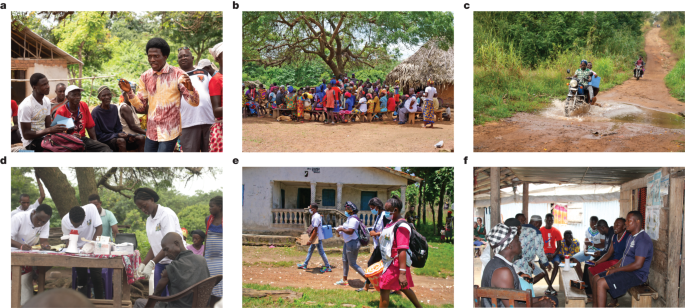Improving Vaccine Uptake in Sierra Leone through Last-Mile Delivery
핵심 개념
Our study highlights the effectiveness of last-mile delivery strategies in increasing vaccine uptake in remote areas of Sierra Leone, showcasing a significant improvement in immunization rates and cost-effectiveness.
초록
Less than 30% of Africans received the COVID-19 vaccine even after 18 months. In Sierra Leone, an intervention with last-mile delivery and community mobilization increased immunization rates by 26 percentage points within 48-72 hours. The intervention also doubled the number of inoculations administered, costing $33 per person vaccinated. Prioritizing mobile services can overcome access difficulties and boost health service uptake in developing countries.
Last-mile delivery increases vaccine uptake in Sierra Leone - Nature
통계
Less than 30% of people in Africa received a dose of the COVID-19 vaccine even 18 months after vaccine development.
The intervention with mobile vaccination teams increased the immunization rate by about 26 percentage points within 48–72 h.
The additional people vaccinated per intervention site translated to an implementation cost of US $33 per person vaccinated.
인용구
"Our study demonstrates that prioritizing mobile services to overcome access difficulties faced by remote populations in developing countries can generate increased returns in terms of uptake of health services."

더 깊은 질문
How can other countries implement similar last-mile delivery strategies to improve vaccine uptake?
To implement similar last-mile delivery strategies for improving vaccine uptake, countries can start by identifying remote and underserved areas where access to healthcare services is challenging. Establishing mobile vaccination teams equipped with vaccines, trained health professionals, and necessary supplies would be crucial. These teams should be well-organized and have clear communication channels to coordinate their efforts effectively.
Community mobilization plays a significant role in encouraging people to get vaccinated. Engaging local leaders, community health workers, and residents through awareness campaigns can help build trust and increase acceptance of vaccinations. Offering incentives or rewards for getting vaccinated may also boost participation rates.
Furthermore, optimizing logistics is essential for the success of last-mile delivery strategies. This includes efficient route planning, cold chain management for vaccine storage, and real-time tracking systems to monitor team movements and vaccine distribution accurately.
Collaboration with local authorities, non-governmental organizations (NGOs), and international partners can provide additional support in terms of resources, funding, expertise, and knowledge sharing. By adapting these principles tailored to their specific contexts and needs, other countries can replicate Sierra Leone's successful approach in enhancing vaccine uptake through last-mile delivery.
What are potential challenges or drawbacks associated with relying heavily on mobile vaccination teams?
While mobile vaccination teams offer a practical solution for reaching remote populations efficiently, several challenges need consideration when relying heavily on this approach:
Logistical complexities: Managing multiple teams operating in diverse locations requires meticulous planning to ensure timely arrival at designated sites while maintaining the integrity of vaccines during transportation.
Resource constraints: Maintaining a fleet of vehicles equipped with medical supplies incurs ongoing costs that may strain limited budgets if not adequately funded.
Quality control: Ensuring consistent training standards among team members across different regions is vital to guarantee the safe administration of vaccines according to protocols.
Sustainability: The long-term sustainability of mobile vaccination programs depends on continued funding commitments from governments or donors beyond initial implementation phases.
Community engagement: Building trust within communities served by mobile teams is essential but may require time and effort due to cultural beliefs or misinformation about vaccines.
How can technology be integrated into last-mile delivery strategies for healthcare beyond vaccines?
Technology offers various opportunities for enhancing last-mile delivery strategies in healthcare beyond just vaccines:
Telemedicine: Utilizing telehealth platforms enables remote consultations between patients in underserved areas and healthcare providers located elsewhere without physical presence requirements.
Mobile health apps: Developing user-friendly applications that provide information on preventive care measures or medication reminders helps empower individuals in managing their health proactively.
3..Geospatial mapping tools: Leveraging geographic information systems (GIS) facilitates accurate mapping of population distribution patterns aiding resource allocation decisions based on real-time data analysis.
4..Drones: Implementing drone technology allows rapid transport of medical supplies such as blood samples or medications over difficult terrains inaccessible by traditional means.
5..Electronic Health Records (EHR): Adopting EHR systems streamlines patient data management ensuring continuity of care regardless of location changes while promoting interoperability among healthcare providers.
By integrating these technological solutions strategically into existing healthcare infrastructure frameworks tailored towards addressing specific needs within each context will optimize service delivery efficiency while improving overall health outcomes beyond just vaccinations alone
0
